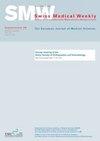瑞士心脏移植受者队列中移植前使用持久持续流机械循环支持的移植后存活率
IF 2.1
4区 医学
Q2 MEDICINE, GENERAL & INTERNAL
引用次数: 0
摘要
背景:如今,全球几乎有一半的心脏移植手术候选者在接受移植手术时需要接受持久的持续血流机械循环支持(CF-MCS)。这种演变是由于等待时间逐渐延长,从而增加了血液动力学恶化的风险。美国器官共享联合网络(United Network of Organ Sharing)最近的研究结果表明,CF-MCS持续时间越长,发生与设备相关并发症的风险越高,可能会对移植后的预后产生不利影响。方法:瑞士的一个两中心心脏移植项目对 2008-2020 年间接受移植手术的连续患者进行了一项回顾性观察研究。研究的主要目的是确定移植后全因死亡率在无 CF-MCS 或移植前有 CF-MCS 的心脏移植受者之间是否存在差异。次要结果是移植后第一年内的急性细胞排斥评分。结果:研究参与者的中位年龄为54岁;38/158(24%)人为女性。53/158名研究参与者(34%)在移植前患有CF-MCS,中位治疗时间为280天。在移植前患有CF-MCS的心脏移植受者中,缺血性心肌病的发病率较高(51% vs 32%;p = 0.013),左心室射血分数较低(20 vs 25;p = 0.047),肺血管阻力较高(2.3 vs 2.1 Wood Units;p = 0.047)。在研究期间,移植前患有CF-MCS的心脏移植受者比例和移植前CF-MCS治疗持续时间均有所增加(2008-2014年 vs 2015-2020年:22% vs 45%,p = 0.009;每年治疗天数增加:分别为 34.4 ± 11.2 天,p = 0.003)。移植前接受 CF-MCS 或直接接受心脏移植的心脏移植受者之间的主要和次要结果没有差异(对数秩 p = 0.515;分别为 0.16 vs 0.14;p = 0.81)。结论:该数据表明,尽管移植前辅助装置治疗的持续时间逐渐延长,但移植前CF-MCS和随后的正位心脏移植策略提供的移植后预后与直接心脏移植并无不同。本文章由计算机程序翻译,如有差异,请以英文原文为准。
Post-transplant survival with pre-transplant durable continuous-flow mechanical circulatory support in a Swiss cohort of heart transplant recipients
BACKGROUND: Worldwide, almost half of all heart transplantation candidates arrive today at their transplant operation with durable continuous-flow mechanical circulatory support (CF-MCS). This evolution is due to a progressive increase of waiting list time and hence an increased risk of haemodynamic worsening. Longer duration of CF-MCS is associated with a higher risk of device-related complications with potential adverse impact on post-transplant outcome as suggested by recent results from the United Network of Organ Sharing of the United States. METHODS: A 2-centre Swiss heart transplantation programme conducted a retrospective observational study of consecutive patients of theirs who underwent a transplant in the period 2008–2020. The primary aim was to determine whether post-transplant all-cause mortality is different between heart transplant recipients without or with pre-transplant CF-MCS. The secondary outcome was the acute cellular rejection score within the first year post-transplant. RESULTS: The study participants had a median age of 54 years; 38/158 (24%) were females. 53/158 study participants (34%) had pre-transplant CF-MCS with a median treatment duration of 280 days. In heart transplant recipients with pre-transplant CF-MCS, the prevalence of ischaemic cardiomyopathy was higher (51 vs 32%; p = 0.013), the left ventricular ejection fraction was lower (20 vs 25; p = 0.047) and pulmonary vascular resistance was higher (2.3 vs 2.1 Wood Units; p = 0.047). Over the study period, the proportion of heart transplant recipients with pre-transplant CF-MCS and the duration of pre-transplant CF-MCS treatment increased (2008–2014 vs 2015–2020: 22% vs 45%, p = 0.009; increase of treatment days per year: 34.4 ± 11.2 days, p = 0.003; respectively). The primary and secondary outcomes were not different between heart transplant recipients with pre-transplant CF-MCS or direct heart transplantation (log-rank p = 0.515; 0.16 vs 0.14, respectively; p = 0.81). CONCLUSION: This data indicates that the strategy of pre-transplant CF-MCS with subsequent orthotopic heart transplantation provides post-transplant outcomes not different to direct heart transplantation despite the fact that the duration of pre-transplant assist device treatment has progressively increased.
求助全文
通过发布文献求助,成功后即可免费获取论文全文。
去求助
来源期刊

Swiss medical weekly
医学-医学:内科
CiteScore
5.00
自引率
0.00%
发文量
0
审稿时长
3-8 weeks
期刊介绍:
The Swiss Medical Weekly accepts for consideration original and review articles from all fields of medicine. The quality of SMW publications is guaranteed by a consistent policy of rigorous single-blind peer review. All editorial decisions are made by research-active academics.
 求助内容:
求助内容: 应助结果提醒方式:
应助结果提醒方式:


